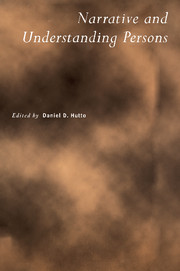Book contents
- Frontmatter
- Contents
- List of Contributors
- Notes on Contributors
- Narrative and Understanding Persons
- Framing Narratives
- The Narrative Practice Hypothesis: Origins and Applications of Folk Psychology
- Dramatic Irony, Narrative, and the External Perspective
- Episodic Ethics
- On the Distance between Literary Narratives and Real-Life Narratives
- Reasons to be Fearful: Strawson, Death and Narrative
- Stories, Lives, and Basic Survival: A Refinement and Defense of the Narrative View
- Self and Other: The Limits of Narrative Understanding
- Pathologies in Narrative Structures
The Narrative Practice Hypothesis: Origins and Applications of Folk Psychology
Published online by Cambridge University Press: 04 May 2010
- Frontmatter
- Contents
- List of Contributors
- Notes on Contributors
- Narrative and Understanding Persons
- Framing Narratives
- The Narrative Practice Hypothesis: Origins and Applications of Folk Psychology
- Dramatic Irony, Narrative, and the External Perspective
- Episodic Ethics
- On the Distance between Literary Narratives and Real-Life Narratives
- Reasons to be Fearful: Strawson, Death and Narrative
- Stories, Lives, and Basic Survival: A Refinement and Defense of the Narrative View
- Self and Other: The Limits of Narrative Understanding
- Pathologies in Narrative Structures
Summary
Folk Psychological Practice
Psychologically normal adult humans make sense of intentional actions by trying to decide for which reason they were performed. This is a datum that requires our understanding. Although there have been interesting recent debates about how we should understand ‘reasons’, I will follow a long tradition and assume that, at a bare minimum, to act for a reason involves having appropriately interrelated beliefs and desires.
He left the party because he believed the host had insulted him. She will head for the cabin in the woods because she wants peace and quiet. These are typical examples of reason explanations, one backward looking and the other future facing. Both imply more than they say. To leave a party because of a suspected insult suggests that one desires not to be insulted, or at least it implies that the desire to avoid insult is stronger than that for some other good on offer. Similarly, to seek tranquillity in an isolated cabin implies that one believes that it can be found there, or at least more so than elsewhere. Despite the fact that the situations and characters involved in these dramas are woefully under-described, we are able to ‘make sense’ of these actions in a basic manner using the belief/desire schema. This involves designating a particular pairing of a belief and a desire, each with its own specified propositional content, in a way that rests on a quiet understanding of the way propositional attitudes inter-relate.
- Type
- Chapter
- Information
- Narrative and Understanding Persons , pp. 43 - 68Publisher: Cambridge University PressPrint publication year: 2007
- 30
- Cited by



